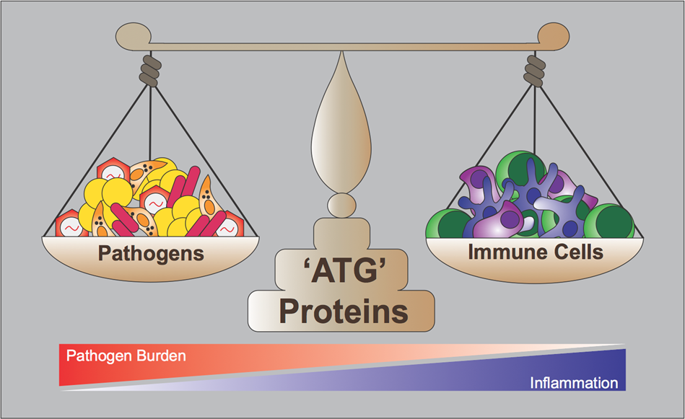当前位置:
X-MOL 学术
›
Cell Death Differ.
›
论文详情
Our official English website, www.x-mol.net, welcomes your
feedback! (Note: you will need to create a separate account there.)
Autophagy and microbial pathogenesis.
Cell Death and Differentiation ( IF 13.7 ) Pub Date : 2020-01-02 , DOI: 10.1038/s41418-019-0481-8 Matthew D Keller 1, 2 , Victor J Torres 2 , Ken Cadwell 1, 2, 3
Cell Death and Differentiation ( IF 13.7 ) Pub Date : 2020-01-02 , DOI: 10.1038/s41418-019-0481-8 Matthew D Keller 1, 2 , Victor J Torres 2 , Ken Cadwell 1, 2, 3
Affiliation

|
Autophagy is a cell biological process that promotes resilience in the face of environmental perturbations. Given that infectious agents represent a major type of environmental threat, it follows that the autophagy pathway is central to the outcome of host-microbe interactions. Detailed molecular studies have revealed intricate ways in which autophagy suppresses or enhances the fitness of infectious agents, particularly intracellular pathogens such as viruses that require the host cell machinery for replication. Findings in animal models have reinforced the importance of these events that occur within individual cells and have extended the role of autophagy to extracellular microbes and immunity at the whole organism level. These functions impact adaptation to bacteria that are part of the gut microbiota, which has implications for the etiology of chronic disorders such as inflammatory bowel disease. Despite major advances in how autophagy regulates inflammatory reactions toward microbes, many challenges remain, including distinguishing autophagy from closely related pathways such as LC3-associated phagocytosis. Here, we review the role of autophagy in microbial pathogenesis at the level of organismal biology. In addition to providing an overview of the prominent function of autophagy proteins in host-microbe interactions, we highlight how observations at the cellular level are informing pathogenesis studies and offer our perspective on the future directions of the field.
中文翻译:

自噬和微生物发病机制。
自噬是一种细胞生物学过程,可以在面对环境扰动时提高适应力。考虑到感染因素是环境威胁的主要类型,因此,自噬途径对于宿主与微生物相互作用的结果至关重要。详细的分子研究揭示了自噬抑制或增强传染原,尤其是细胞内病原体(例如需要宿主细胞机制进行复制的病毒)的适应性的复杂方式。动物模型中的发现增强了这些事件在单个细胞内发生的重要性,并将自噬作用扩展到了整个生物体水平的细胞外微生物和免疫力。这些功能会影响对肠道菌群的细菌的适应,这对诸如炎症性肠病之类的慢性疾病的病因有影响。尽管自噬如何调节针对微生物的炎症反应方面取得了重大进展,但仍然存在许多挑战,包括将自噬与密切相关的途径(如与LC3相关的吞噬作用)区分开来。在这里,我们综述了自噬在微生物生物学水平上的作用。除了概述自噬蛋白在宿主-微生物相互作用中的突出功能外,我们还将重点介绍在细胞水平上的观察如何为发病机理研究提供信息,并就该领域的未来方向提供我们的观点。包括将自噬与密切相关的途径(例如与LC3相关的吞噬作用)区分开来。在这里,我们综述了自噬在微生物生物学水平上的作用。除了概述自噬蛋白在宿主-微生物相互作用中的突出功能外,我们还将重点介绍在细胞水平上的观察如何为发病机理研究提供信息,并就该领域的未来方向提供我们的观点。包括将自噬与密切相关的途径(例如与LC3相关的吞噬作用)区分开来。在这里,我们综述了自噬在微生物生物学机制中的作用。除了概述自噬蛋白在宿主-微生物相互作用中的突出功能外,我们还将重点介绍在细胞水平上的观察如何为发病机理研究提供信息,并就该领域的未来方向提供我们的观点。
更新日期:2020-01-02
中文翻译:

自噬和微生物发病机制。
自噬是一种细胞生物学过程,可以在面对环境扰动时提高适应力。考虑到感染因素是环境威胁的主要类型,因此,自噬途径对于宿主与微生物相互作用的结果至关重要。详细的分子研究揭示了自噬抑制或增强传染原,尤其是细胞内病原体(例如需要宿主细胞机制进行复制的病毒)的适应性的复杂方式。动物模型中的发现增强了这些事件在单个细胞内发生的重要性,并将自噬作用扩展到了整个生物体水平的细胞外微生物和免疫力。这些功能会影响对肠道菌群的细菌的适应,这对诸如炎症性肠病之类的慢性疾病的病因有影响。尽管自噬如何调节针对微生物的炎症反应方面取得了重大进展,但仍然存在许多挑战,包括将自噬与密切相关的途径(如与LC3相关的吞噬作用)区分开来。在这里,我们综述了自噬在微生物生物学水平上的作用。除了概述自噬蛋白在宿主-微生物相互作用中的突出功能外,我们还将重点介绍在细胞水平上的观察如何为发病机理研究提供信息,并就该领域的未来方向提供我们的观点。包括将自噬与密切相关的途径(例如与LC3相关的吞噬作用)区分开来。在这里,我们综述了自噬在微生物生物学水平上的作用。除了概述自噬蛋白在宿主-微生物相互作用中的突出功能外,我们还将重点介绍在细胞水平上的观察如何为发病机理研究提供信息,并就该领域的未来方向提供我们的观点。包括将自噬与密切相关的途径(例如与LC3相关的吞噬作用)区分开来。在这里,我们综述了自噬在微生物生物学机制中的作用。除了概述自噬蛋白在宿主-微生物相互作用中的突出功能外,我们还将重点介绍在细胞水平上的观察如何为发病机理研究提供信息,并就该领域的未来方向提供我们的观点。











































 京公网安备 11010802027423号
京公网安备 11010802027423号